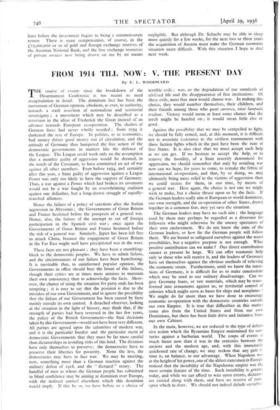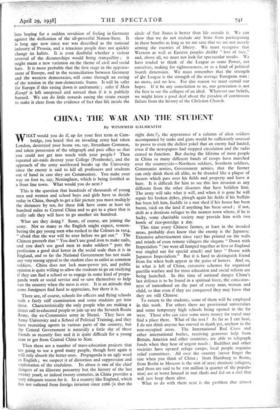FROM 1914 TILL NOW: V. THE PRESENT DAY
By E. L. WOODWARD
THE course of events since the breakdown of the Disarmament Conference is too recent to need recapitulation in detail. The dominant fact has been the movement of German opinion, obedient, as ever, to authority, towards a stark assertion of nationalism and territorial sovereignty ; a movement which may be described as a reversion to the ideas of Frederick the Great instead of an advance towards European co-operation. The shadow of German force had never wholly receded ; from 1934 it darkened the rest of Europe. In politics, as in economics, bad money drives good money out of circulation, and the attitude of Germany thus hampered the free action of the democratic governments in matters like the defence of the League. The League could work only on the assumption that a member guilty of aggression would be deemed, in the words of the Covenant, to have committed an act of war against all other members. Even before 1934, and certainly after this year, a State guilty of aggression against a League Power was only too likely to have the support of Germany. Thus, a war against a Power which had broken its covenants would not be a war fought by an overwhelming coalition against one defaulter, but a long-drawn struggle of equally- matched alliances.
Hence the failure of a policy of sanctions after the Italian aggression in Abyssinia ; the Governments of Great Britain and France hesitated before the prospects of a general war. Hence, also, the failure of the attempt to cut off foreign participation in the Spanish civil war ; once again the Governments of Great Britain and France hesitated before the risk of a general war. Similarly, Japan has been left free to attack China, because the engagement of Great Britain in the Far East might well have precipitated war in the west.
These facts are not pleasant ; they have been a stumbling- block to the democratic peoples. We have to admit failure, and the circumstances of our failure have been humiliating. It is inevitable that, to uninformed popular opinion, the Governments in office should bear the brunt of this failure, though their critics are at times more anxious to maintain their own consistency than to acknowledge the facts. More- over, the chance of using the situation for party ends has been tempting ; it is easy to say that the position is due to the mistakes of our own Government, and to ignore the possibility that the failure of our Government has been caused by facts mainly outside its own control. A detached observer, looking at the situation in the light of history, may think that, if the strength of parties had been reversed in the last few years, the policy of the British Government—the final decisions taken by this Government—would not have been very different. All parties are agreed upon the calamities of modern war, and it is the particular burden and the particular merit of democratic Governments that they must be far more careful than dictatorships in avoiding risks of this kind. The dictators have only themselves to preserve ; the democracies have to preserve their liberties for posterity. None the less, the democracies may have to face war. We may be meeting, now, something more than a German reaction against the military defeat of 1918, and the " dictated " treaty. The handful of men to whom the German people has submitted in blind confidence may be aiming at dominion over Europe, with the indirect control elsewhere which this dominion would imply. If this be so, we have before us a choice of terrible evils ; war, or the degradation of our standards of civilised life and the disappearance of free institutions. Of these evils, most free men would choose war. In making this choice, they would number themselves, their children, and their friends among those who quasi cursores, vitai lampada tradunt. Victory would mean at least some chance that the torch might be handed on ; it would mean little else of good.
Against the possibility that we may be compelled to fight, we should be fully armed, and, at this moment, it is difficult not to associate resistance to the swiftest rearmament with those faction fights which in the past have been the ruin of free States. It is also clear that we must accept such help as we can get. If we hesitate to accept the help, or to remove the hostility, of a State recently denounced for aggression, we should remember that only by avoiding war now can we hope, for years to come, to remake the fabric of international co-operation, and that, by so doing, we may ultimately bring more relief to the victims of aggression than we could secure for them, in our time, by means of a general war. Here again, the choice is not one we might wish to make, but a choice thrust upon us by the facts. If the German leaders really aim at European or world dominion, our own strength, and the co-operation of other States, drawn together in a common fear, may yet save the situation.
The German leaders may have no such aim ; the language used by them may perhaps be regarded as a diversion for followers who might otherwise be the uneasy spectators of their own enslavement. We do not know the aims of the German leaders, or how far the German people will follow them. We are bound to safeguard ourselves against the worst possibilities, but a negative purpose is not enough. What positive contribution can we make ? Our direct contribution cannot at present be large. We can offer economic help only to those who will receive it, and the leaders of Germany have set themselves against the obvious methods of relieving the economic strain. Furthermore, until we know the inten- tions of Germany, it is difficult for us to make concessions which may be used to our military disadvantage. Can we give Germany loans, or raw materials, which may be trans- formed into armaments against us, or territorial control ol colonies which might serve as bases for ships and aeroplanes f We might do far more than we have done to encourage economic co-operation with the democratic countries outsidc our own Empire. It is true that difficulties in this matter come also from the United States and from our own Dominions, but there has been little drive and initiative from our own Cabinet.
In the main, however, we are reduced to the type of defen- sive action which the Byzantine Empire maintained for cen- turies against a barbarian world. The tempo of events is much faster now than it was in the centuries between the ancient and the modern age, and, with this immensely quickened rate of change, we may reckon that any gain of time is, on balance, to our advantage. When Napoleon was at the height of his power, one of the ablest statesmen in Europe noticed that the instability of the Napoleonic empire was the most certain feature of the time. Such instability is greater today, and while we can afford to wait upon events, dictators are carried along with them, and have no reserve of years upon which to draw. We should not indeed delude ourselve- into hoping for a sudden revulsion of feeling in Germany against the deification of the all-powerful Nation-State. It is long ago now since war was described as the national industry of Prussia, and a tenacious people does not quickly change its habits. It is even doubtful whether a violent reversal of the dictatorships would bring tranquillity ; it might mean a new variation on the theme of civil and social hate. It is more probable that the first stage in the appease-. ment of Europe, and in the reconciliation between Germany and the western democracies, will come through an easing of the tension in the non-democratic States. It will be safer for Europe if this easing down is undramatic ; safer if Mein Kampf is left unopened and unread than if it is publicly burned. We can do little towards easing the strain except to make it clear from the evidence of fact that life inside the circle of free States is better than life outside it. We can show that we do not exclude any State from participating in these benefits as long as we are sure that we are not merely arming the enemies of liberty. We must recognise that Western as well as Eastern peoples dislike "loss of face," and, above all, we must not look for spectacular results. We have tended to think of the League as some Power, not ourselves, making for righteousness, or as a kind of political fourth dimension. We must remember that the strength of the League is the strength of the average European man : no more, and no less. For this reason we must curtail our hopes. If it be any consolation to us, our generation is not the first to see the collapse of an ideal. Whatever our beliefs, we might learn a good deal about the paradox of continuous failure from the history of the Christian Church.



























































 Previous page
Previous page